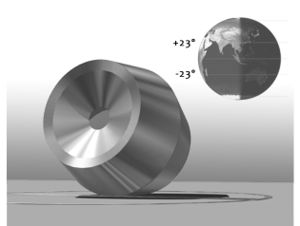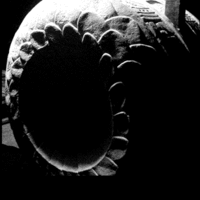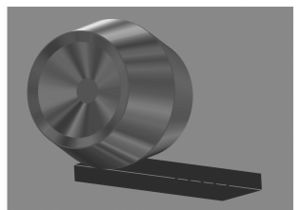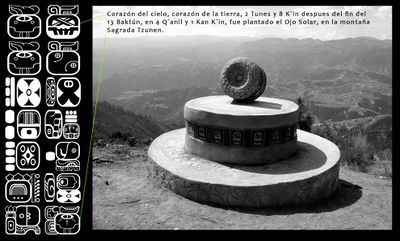Difference between revisions of "Solar Eye"
| Line 11: | Line 11: | ||
[[File:Ojo_Solar_sombra01.jpg|500px |right]] | [[File:Ojo_Solar_sombra01.jpg|500px |right]] | ||
| − | |||
The Kabawil was designed as an instrument to support the practice of the Mayan Time Keepers, to re connect the calendar with its astronomical origins. | The Kabawil was designed as an instrument to support the practice of the Mayan Time Keepers, to re connect the calendar with its astronomical origins. | ||
Latest revision as of 19:09, 27 January 2023
The Solar Eye is a solar marker sculpture representing the sun´s trajectory in 8 important dates of the earth´s travel around it´s orbit. Solstices, equinoxes and the days of zenith and nadir passage of the sun, occurring only in the tropics, between +23 and -23 degrees.
Solstices and equinoxes happen at the same time all around the world, but the passages of the sun trough the zenith, and nadir depend on the latitude. In Guatemala those days have been observed in pre columbian times, and some celebrations survived to this day, like the day of the cross May 1 that happens close to the zenith passage of the sun, and the Nadir passage of the sun, celebrated on Nov 1, on the day of the dead. On this date, the sun is in the direction of the centre of the earth at midnight.
Ojo Solar Kabawil
The Kabawil was designed as an instrument to support the practice of the Mayan Time Keepers, to re connect the calendar with its astronomical origins.
The combination of base and sculpture representing the sun's trajectory along the ecliptic can be used to lecture about the movement of the earth around the sun, astronomy, calendars, Maya epigraphy, etc.
Because of its symmetry, the play of light and shadows can be seen through the day, not only at dusk or dawn.
During the equinoxes, no light shines on the eyes, as we approach the solstices, the shadows eye lid begins to open.
The north looking eye opens at the summer solstice, while the south looking eye opens completely at the winter solstice.
During the equinoxes, the shadow of the Solar Eye is divided in two by a light beam representing Kukulkan descent over the earth. during the day, the shadows of five spheres trapped between the two halves traverse the East-West line, representing the 5 planets trough the ecliptic path.
When the shadows eye lid touches the rim of the inner circle in the South eye, it is the Nadir passage of the sun, around Nov 1 and Feb 10 in Guatemala.
Background
The Solar Eye was designed by David Marín for the Plural School of Political action for Mayan woman, to create an educative experience coupled to the ritual activities of the Tzunen mountain in San Marcos Guatemala.
It represents a seed, the complementarity of opposites, the duality, the brain hemispheres, the time´s thread wrapping around it, the feathered serpent´s egg, represented by the Celestial Band around it.
As part of the school for political action, the Solar Eye is more than a sculpture, it becomes a ritual object used to reflect about our place in the solar system, in relation to ancient cultures, the history of the Maya-Mam population, etc.
At this mountain, the sculpture is also part of a political action to protect this sacred site from the mining industry that has destroyed several mountains in the region, adding an educational, and touristic aspect to the mountain, visited by schools, churches and people in general.












